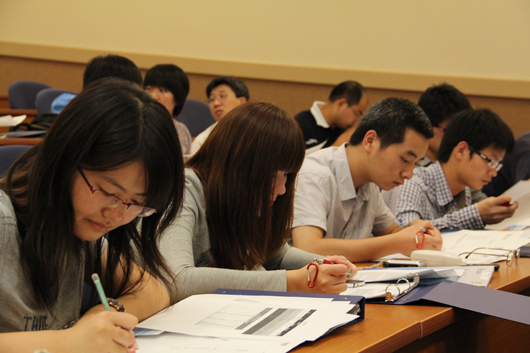Asia/China/universityworldnews.com
Resumen: La nueva burocracia de datos podría obstaculizar la investigación internacional. Las nuevas regulaciones de China restringen la «exportación» de datos científicos recolectados dentro del país y afirman que cualquier investigación para su publicación en revistas internacionales debe ser aprobada primero por una autoridad nueva, aún por establecer, está causando incertidumbre y preocupación a muchos investigadores que están trabajando en colaboración con China. La Oficina General del Consejo de Estado de China, equivalente al gabinete de China, emitió su nueva ‘Medidas para la Administración de Datos Científicos’ el 17 de marzo y la hizo pública en abril como parte de su campaña para «acelerar la innovación tecnológica» en el país mediante mejoras recopilación de datos, almacenamiento y seguridad y políticas de intercambio. El borrador de la reglamentación, la primera vez que China publicó regulaciones nacionales sobre datos científicos, exige que todos los datos científicos generados en China sean enviados por «la entidad principal del programa» a los «centros de datos estatales» para su revisión y aprobación antes de la publicación. levantó las cejas de quienes reúnen información que podría considerarse sensible a las autoridades chinas. «Esto tendrá un claro efecto de enfriamiento en la colaboración de investigación internacional con China, y hará que el entorno actual, en el que ya es muy difícil colaborar abiertamente con colegas chinos en proyectos de investigación, sea aún más difícil, especialmente en áreas sensibles como las étnicas de China». las minorías o su periferia inquieta «, dijo James Leibold, profesor asociado de la Universidad La Trobe de Australia y experto en la región china de Xinjiang, que actualmente se enfrenta a una importante ofensiva china. Los datos científicos pueden compartirse con colaboradores extranjeros en el caso de cooperación o intercambios transfronterizos, excepto en el caso de «secretos de estado», donde se necesita una aprobación especial del Ministerio de Ciencia y Tecnología, de acuerdo con el proyecto de reglamento. Pero los académicos observan que la definición de ‘secretos de estado’ en China es notoriamente nebulosa y mal definida.
China’s new regulations restricting the ‘export’ of scientific data collected within the country and asserting that any research for publication in international journals must first be approved by a new, yet to be set up authority, are causing uncertainty and concern for many researchers who are working in collaboration with China.
China’s General Office of the State Council, equivalent to China’s cabinet, issued its new ‘Measures for the Administration of Scientific Data’ on 17 March and made it public in April as part of its drive to “accelerate technological innovation” in the country through improved data gathering, storage and security and sharing policies.
The draft regulation, the first time China has released national regulations on scientific data, requires all scientific data generated within China to be submitted “by the lead programme entity” to “state data centres” for review and approval before publication – a requirement that has raised the eyebrows of those who gather information that could be deemed sensitive to the Chinese authorities.
«This will have a clear chilling effect on international research collaboration with China, and will make the current environment, in which it is already very difficult to openly collaborate with Chinese colleagues on research projects, even more difficult, especially in sensitive areas like China’s ethnic minorities or its restive periphery,» said James Leibold, associate professor at Australia’s La Trobe University and an expert on China’s Xinjiang region, which is currently facing a major Chinese crackdown.
Scientific data may be shared with foreign collaborators in the case of cross-border cooperation or exchanges, except in the case of “state secrets” where special approval is needed from the ministry of science and technology, according to the draft regulation. But academics note that the definition of ‘state secrets’ in China is notoriously nebulous and ill-defined.
Hogan Lovells, a law firm in Beijing advising companies on the new regulation, said in a briefing document issued last month: “Will overseas scientific researchers be willing to exchange data with their Chinese counterparts – especially in government programmes – knowing that the latter may have an obligation to turn the data over to the Chinese government?”
The regulation further notes that when scientific data is to be transmitted outside China “in connection with a document submitted for publication”, such scientific data is to be submitted first to the authorities for review, though it is not yet clear what systems are currently in place to do so. It is «another example of the [Communist] Party’s desire to control everything inside of China, and now increasingly abroad», Leibold said.
“Scientific data generated through societal funding” must also be collected and submitted to the applicable scientific data centre “if it involves state secrets, national security or societal and public interests”, the new regulation states.
The definition of scientific data includes data generated through basic research, applied research and pilot tests but also “raw data and derivative data” through “monitoring and observation, investigation, inspection and testing” for use in scientific research.
Although the rules refer to yet to be identified “state data centres” which will approve data sharing, the April draft says the central body that regulates, oversees and censors the internet within the country the Cyberspace Administration of China, public security agencies and national agencies will have the right to refuse or prohibit the transfer of any data out of China “at their discretion”.
While the current draft regulation is very general, with implementation details still to be drawn up, the new restrictions could hamper open access and data sharing in international collaborations, according to Deborah Elms, executive director of the Asian Trade Centre in Singapore, which also monitors digital trade.
“On the face of it, this sounds horrible and it will not be helpful for trade, for collaboration, for scientific research and for business. Anyone who moves data overseas in the future is at risk,” Elms told University World News.
“It is a huge barrier to trade and data collection but to understand the extent of the challenge you will have to see the on-the-ground implementation,” which she noted had not yet been outlined in detail by the Chinese government.
Security agencies and data
At the same time the regulations called for open access and data sharing to “accelerate commercialisation” and promote innovation and economic growth in China.
“In recent years, China has seen major scientific development and explosive growth in the amount of scientific data. However, it has lacked a national-level regulation to govern the data, and its management has lagged behind developed countries,” said Ye Yujiang, director of the basic research department at the Ministry of Science and Technology during a news conference on 4 April in Beijing.
Although many academics acknowledge China’s policies on security management and data sharing are in need of improvement, they note with alarm that the new regulations give security agencies far-reaching powers to control any data collected within China.
This could also apply to scientific data held by anyone outside China not directly funded by the Chinese government but funded by a mixture of government and non-government sources.
This is particularly a concern in the area of big data and artificial intelligence where research collaborations between publicly-funded universities and private companies have mushroomed in the past 18 months.
“The Chinese government is evidently seeking to ensure that innovation ‘Made in China’ will stay in China,” says Elsa Kania, an adjunct fellow with the Washington DC-based Center for A New American Security’s Technology and National Security Program.
“The policy purports to promote open access to and sharing of scientific data within China while creating ambiguous new restrictions, that, depending upon their implementation, could render future cooperation asymmetrical in its benefits,” said Kania in a policy brief published last month by the International Cyber Policy Centre of the Australian Strategic Policy Institute think tank.
‘Data nationalism’
Universities have already noted emerging ‘data nationalism’ where countries see a strategic advantage in controlling big data and are becoming more reluctant to share data, particularly health data, across borders. But China has presented its new regulation as bringing China’s rules up to the standards of other developed countries.
«In some instances, a lot of valuable data has not been fully used by Chinese scientists, and some has even leaked to foreign countries,» said the Ministry of Science and Technology’s Ye. «Data regulation has been a weak link in China’s effort to become a global technological powerhouse, so the new regulations are welcome remedies.
“Scientific and research data are valuable strategic resources for a nation’s scientific and socio-economic development,” Ye added.
Lester Ross, a lawyer and chair of the policy committee of the American Chamber of Commerce in China, said: “China faces the risk that excessive controls on the publication and export of scientific data will obstruct the openness and international collaboration on which scientific research depends, thereby slowing innovation and economic growth.”
Ross suggested in a comment article published earlier this monthby Nikkei Asian Review that China should “revise and narrow the reach of the measures before they harm its quest for innovation”.
“If the rules applied only to publicly-funded research and supported open publication, they would be consistent with policies encouraging open access to publicly-funded research data in Europe, the US and other jurisdictions,” Ross said. But Beijing’s measures go well beyond their foreign counterparts’, raising major concerns “about China’s commitment to scientific openness”.
The State Council’s measures also imply “an ambivalence to publishing in prestigious international journals”, Ross noted. “Restrictions on the export of scientific data will serve to discourage international publication in favour of onshore publication. This will have the side-benefit of boosting Chinese ‘soft power’ by fostering greater demand for its own scientific journals but may impede efforts to reduce scientific fraud.”
Fuente: http://www.universityworldnews.com/article.php?story=20180720072113906
Imagen tomada de: https://cms.qz.com/wp-content/uploads/2017/06/china-cybersecurity-law-data.jpg?quality=80&strip=all&w=3500













 Users Today : 12
Users Today : 12 Total Users : 35460673
Total Users : 35460673 Views Today : 32
Views Today : 32 Total views : 3419777
Total views : 3419777